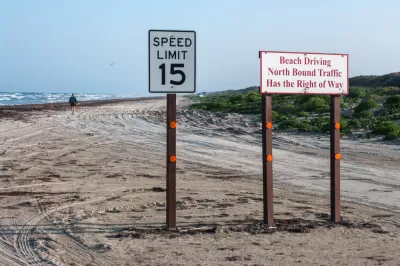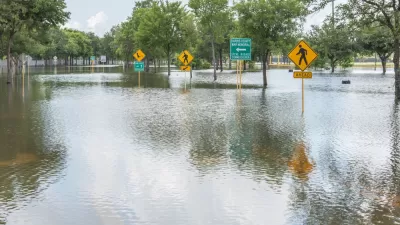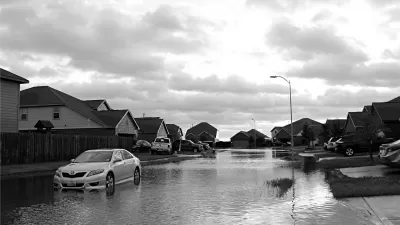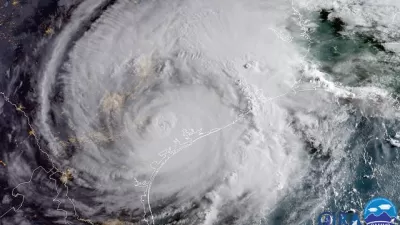In a new book, lawyer Jim Blackburn suggests that engaging private landowners is the only way to manage the coast of his home state.

Hurricane Harvey brought up a number of questions for residents of the Gulf Coast of Texas. Was the damage so severe because of zoning, or sprawl, or climate change? Is it better to rebuild or buy out? Is a storm just as severe inevitable?
And more than anything, how do we keep this from happening again?
Environmental lawyer Jim Blackburn presents one strategy in his new book, A Texan Plan for the Texas Coast, calling “not for greater regulation but for new markets.”
There are several unique attributes of the Gulf Coast of Texas that make a private-sector approach to management the strongest, according to the author, who leads a research group at Rice University called the Severe Storm Prevention, Education, and Evacuation from Disasters Center (SSPEED).
“The Texas Gulf coast is one of the least regulated of U.S. coastal areas. Blackburn attests that without federal environmental law (Clean Air Act and Clean Water Act) and the Army Corps of Engineers, for which he taught in the 1980s, there would be no environmental law on the Texas coast. Since 1972, when Texas rejected the federal regulations and funding of the Coastal Zone Management Act (CZMA), the state has more or less managed its own coast.”
A related attribute is that 80 percent of the land along the Texas Gulf Coast is privately owned. Private property rights in Texas are sacred, so that’s unlikely to change.
“In a market economics based approach, private landholders would sell carbon sequestration credits to corporations in the form of (unregulated) commodity contracts. The consumer would then, ostensibly, purchase such products branded as carbon-neutral.”
Not everyone believes that a voluntary system would be effective, but “Blackburn is optimistic. In his view, eco-services of ranching, birding, and fishing would continue to be maintained through private litigation, entrepreneurship, competition, and personal commitment."
FULL STORY: BOOK ON THE TEXAS GULF COAST OFFERS ‘TEXAN PLAN’

Study: Maui’s Plan to Convert Vacation Rentals to Long-Term Housing Could Cause Nearly $1 Billion Economic Loss
The plan would reduce visitor accommodation by 25,% resulting in 1,900 jobs lost.

North Texas Transit Leaders Tout Benefits of TOD for Growing Region
At a summit focused on transit-oriented development, policymakers discussed how North Texas’ expanded light rail system can serve as a tool for economic growth.

Using Old Oil and Gas Wells for Green Energy Storage
Penn State researchers have found that repurposing abandoned oil and gas wells for geothermal-assisted compressed-air energy storage can boost efficiency, reduce environmental risks, and support clean energy and job transitions.

Private Donations Propel Early Restoration of Palisades Playground
Los Angeles has secured over $1.3 million in private funding to restore the Pacific Palisades playground months ahead of schedule, creating a modern, accessible space that supports community healing after recent wildfires.

From Blight to Benefit: Early Results From California’s Equitable Cleanup Program
The Equitable Community Revitalization Grant (ECRG) program is reshaping brownfield redevelopment by prioritizing projects in low-income and environmental justice communities, emphasizing equity, transparency, and community benefits.

Planting Relief: Tackling Las Vegas Heat One Tree at a Time
Nevada Plants, a Las Vegas-based nonprofit, is combating the city’s extreme urban heat by giving away trees to residents in underserved neighborhoods, promoting shade, sustainability, and community health.
Urban Design for Planners 1: Software Tools
This six-course series explores essential urban design concepts using open source software and equips planners with the tools they need to participate fully in the urban design process.
Planning for Universal Design
Learn the tools for implementing Universal Design in planning regulations.
Ascent Environmental
Borough of Carlisle
Institute for Housing and Urban Development Studies (IHS)
City of Grandview
Harvard GSD Executive Education
Toledo-Lucas County Plan Commissions
Salt Lake City
NYU Wagner Graduate School of Public Service





























